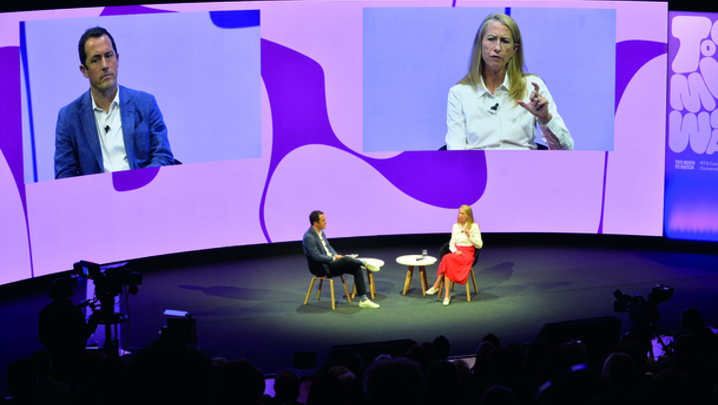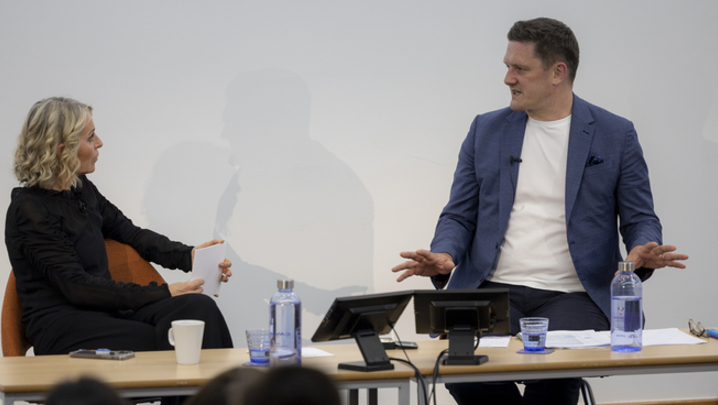Zai Bennett reveals why the satellite giant is splashing out on a star-driven line-up for 2021
The prospect of a brand-new Michael Winterbottom drama starring Kenneth Branagh as a pandemic-beleaguered Boris Johnson has already got mouths watering among audiences and critics alike, and This Sceptred Isle is just one of Sky’s bumper line-up of 125 new Sky Originals promised for 2021.
Keeley Hawes, Rita Ora and Dame Judi Dench are among the other big names bringing star power to Sky, with the broadcaster announcing 30 exclusive original films and 30 documentaries, all part of an impressive roster that promises 50% more original content than last year.
If this seems a highly ambitious project after the production chaos of 2020, Zai Bennett, managing director of content for Sky UK and Ireland, explained that it was the culmination of half a decade’s investment across drama, comedy and entertainment. This has been boosted by Comcast – Sky’s owner since 2018 – pledging to support Sky’s aim of owning its own content: Sky plans to spend £1bn a year on originals by 2024.
Bennett told the RTS: “We’re getting into original film for our Sky Cinema service, and landing documentaries in a really big way. We’re about investing in authorship.”
He revealed that he had already binged on one high-end drama, Intergalactic. Coming to Sky One in April, the series is a mix of soap and sci-fi, following a mutiny on a women’s prison ship in space – what he described as “Orange is the New Black in space”. He noted that “the vast majority of the cast is female – in the sci-fi world, that’s not normally the case. It’s fun, with great production – the money is on screen.”
Away from drama, the factual commissions sound equally broad, with titles such as Liverpool Narcos and The Bambers: Murder at the Farm. Bennett said: “It’s about a theatrical premium experience. Character and narrative are really important in our documentaries.”
The list includes new profile documentaries on Stephen Hawking and Tina Turner, and Bennett sounded particularly enthused by Bruno vs Tyson. “It’s the story of society at that time through the fights these two guys had,” he said, confident that it would find a large audience beyond boxing fans.
Despite the big names on the list, there was good news for aspiring film-makers and producers across the board, claimed Bennett: “For front of screen, it’s all about the narrative and the story. The story’s the star. We’re often looking for shows, developing them from the beginning, investing in authorship.”
In factual, too, there was room for more: “We’re commissioning docs at a fairly fierce rate. We’re coming into this marketplace and we want really high-end pieces.
“Across the genres, there’s plenty of scope for companies to get involved with us. For small companies, there are many ways we can help you or partner up to get those shows away. Our doors are open.”
Anyone visiting Sky’s huge compound at Osterley, west London, comes away aware of the broadcaster’s focus on sustainability. Bennett said: “Sky takes it incredibly seriously. We’ve done it across the board, making sure productions are net carbon neutral. Telly is such an amazing force for change. Where we can have an important impact, we want to try.”
Alongside this concern, sits Sky’s commitment to workplace diversity. Its target is to have a fifth of its employees from ethnic minority backgrounds by 2025. “Sky likes setting itself a target and then smashing it,” he said. “Doing it for our societal good as well is a great thing. We’ve had targets in production since 2014. It’s a moment to judge ourselves, to say to the world, ‘This is how we’re doing it.’”
On-screen, too, he agrees that a bunch of white men together is no longer a good look: “Audiences will desert you. It would be terrible. We can’t make any show that doesn’t reflect the world that we live in.
“We need to help producers, and ask them, ‘Do you need more time to make a show, more money?’ Every show is bespoke, and every solution to inclusion is bespoke.”
Sky’s big plans for 2021 follow a year in which its shows, like those of other broadcasters and streamers, have found big audiences thanks to the lockdowns. “Viewing has gone up massively – the pie got bigger and our share of that pie has grown by 7%,” said Bennett, citing titles such as Gangs of London and Billie Piper’s impressive turn in I Hate Suzie.
This purple patch, however, began the year before with the all-conquering, multiple-award-winning Chernobyl, the epic drama co-funded by Sky that became, as Bennett proudly reminded us, the most-awarded single show ever at the Baftas. Of showrunner Craig Mazin’s phenomenal achievement, Bennett said his own job had been, as it was now, to be the “quality controller”. “All we can do is invest in the creator’s vision. We were there to help them realise that.”
Bennett looked back on the success of the miniseries as a turning point in Sky’s approach to content: “We’d been making pretty good telly up until then but Chernobyl was a moment when everyone said, ‘We’ve got to take you guys seriously’. We’re shoulder to shoulder with the best in the world now.”
As for whether such critical acclaim is more or less important than commercial success, Bennett argued that the two went hand in hand. “Sky is a commercial entity. We make money by our customers being satisfied with shows they can’t get anywhere else, that they think are awesome. Part of people thinking the shows are awesome is winning the odd award.”
Another demonstration of Sky’s ever-broadening goals was the recent addition of Sky Arts to Freeview. “That’s about Sky giving back something to the nation,” was how Bennett explained the decision to take Sky Arts free-to-air. “We want people to enjoy and love that service, showing that we are really part of the cultural community in the UK.”
Brand-building ideas for the channel have included artists being invited to take over the channel for a period and the broadcasting of live performances. “It’s about promoting the arts and being a force for good for the arts,” said Bennett.
With the BBC’s increased focus on iPlayer on the one hand and the growing audiences and deep pockets of the streaming platforms on the other, Sky occupies a unique position in the British marketplace. For Bennett, the broadcaster’s mission remains straightforward: “It’s about adding value to the Sky subscription. The channels are brands. Commissions need to be talked about, to be loved, to be something that sparks conversation.
“We’re not necessarily looking at ratings themselves, it’s more about making sure that customers have choice, that there’s something for everyone in your home that is one of their favourite shows – it’s about the shows being brilliant.”
Pressed on what brilliant shows he had been watching during these strange days and long evenings, Bennett declined to reveal his personal favourites from the many comedies, dramas and factual shows he had commissioned. “That would be a way to make all of my genre routines for the future really awkward,” he said.
Like the rest of us, though, it seems that he is a sucker for something to escape into: “At home, I tend to watch fiction and narrative pieces to relax.”
Report by Caroline Frost. Zai Bennett was in conversation with Minnie Stephenson of Channel 4 News for the RTS on 25 January. The producer was Lisa Campbell.




